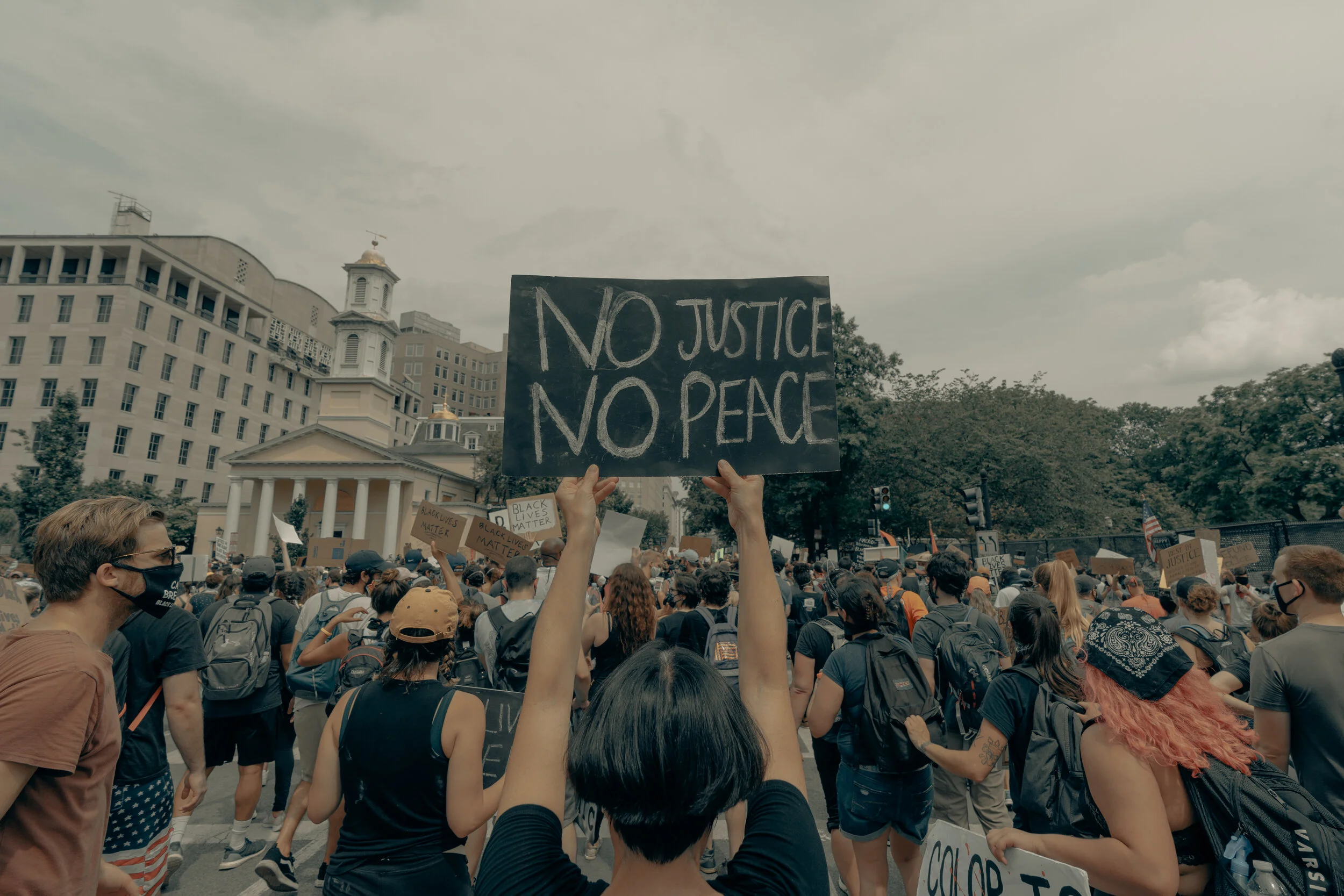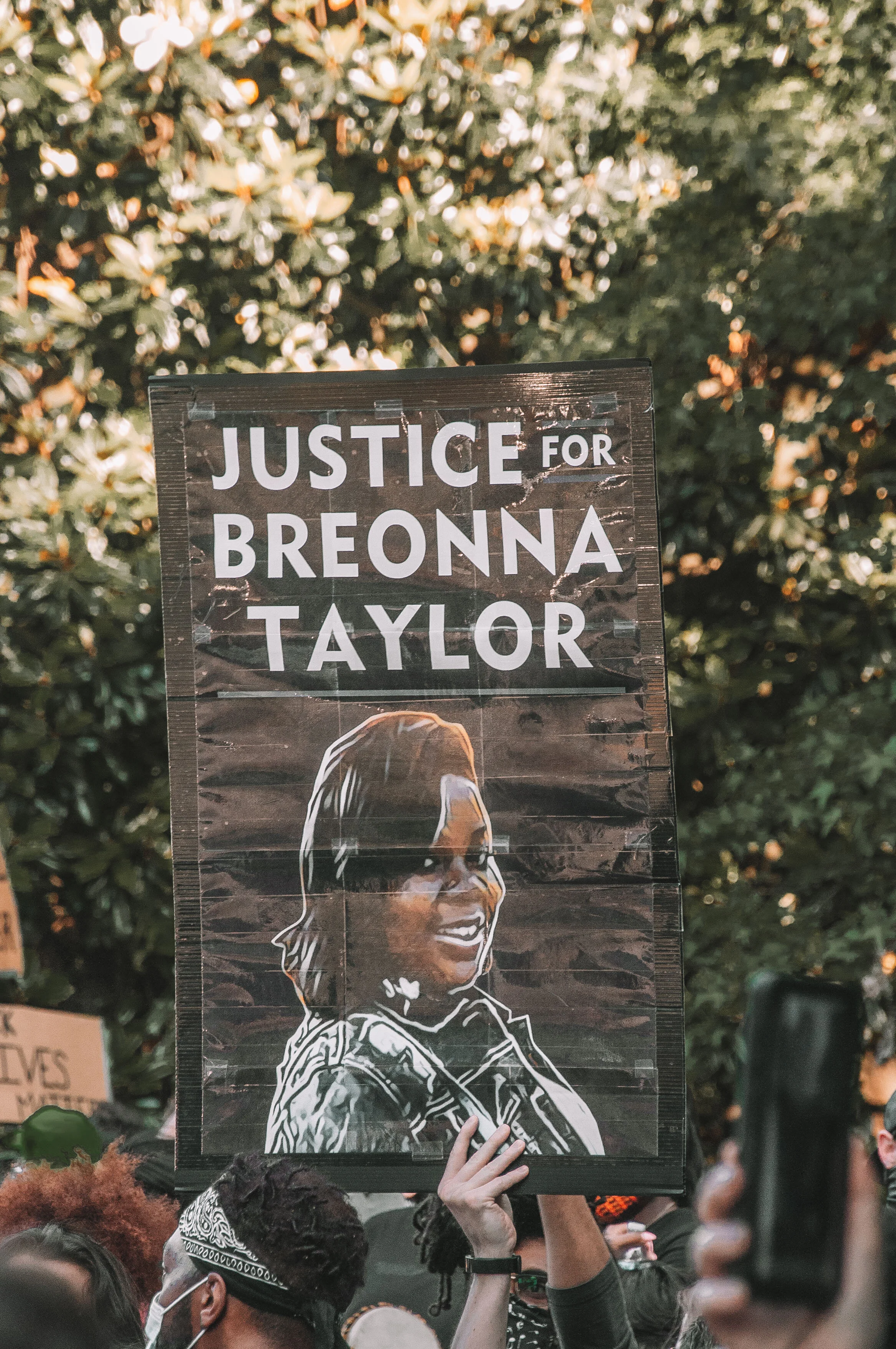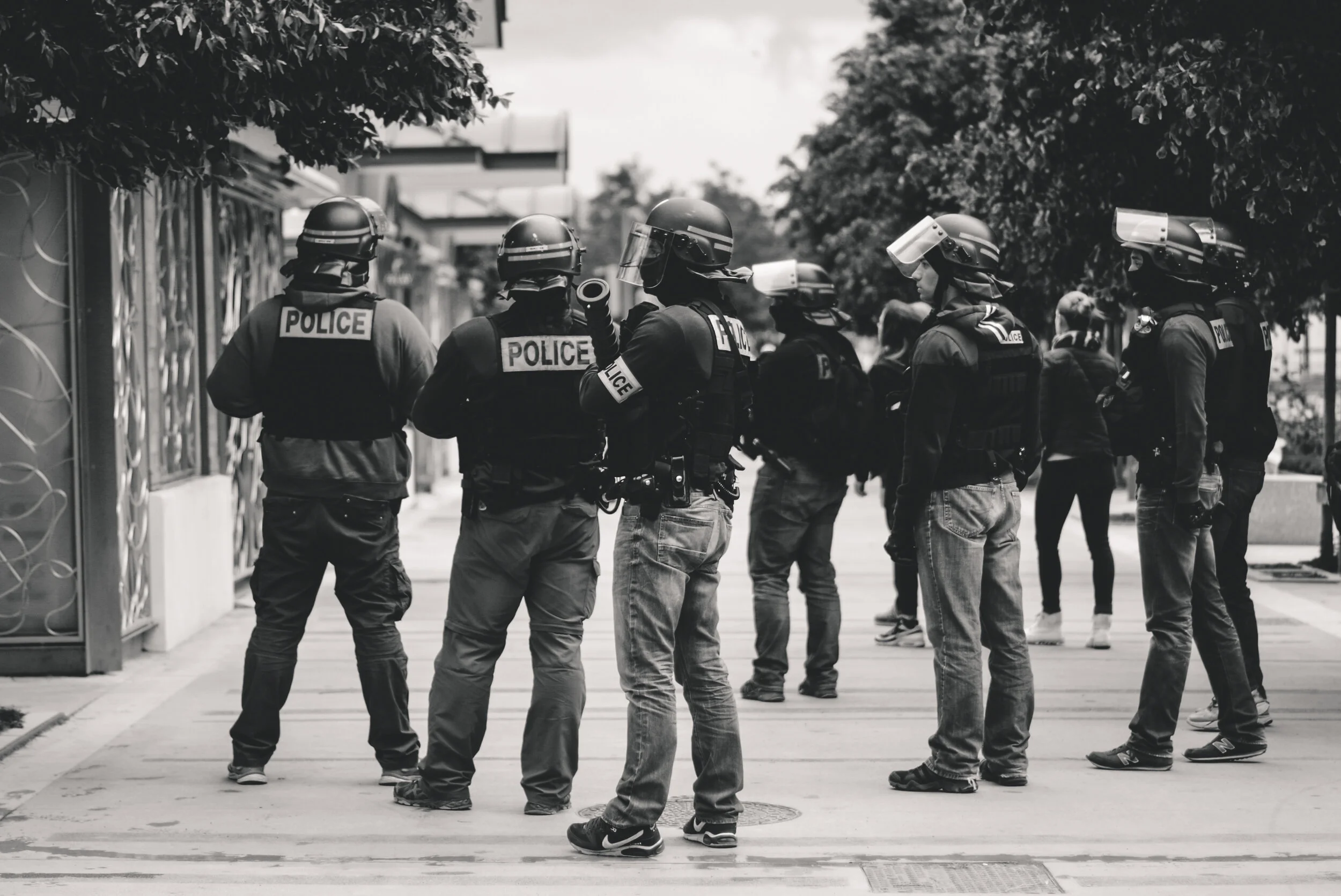BREONNA TAYLOR AND THE SEARCH FOR JUSTICE
WHAT DOES JUSTICE LOOK LIKE AMIDST THE CONFUSION OF THE BREONNA TAYLOR CASE?
Key Facts
Breonna Taylor was a 26-year-old black female who was an emergency room technician and aspired to be a nurse. [1]
On March 13, 2020, just after 12:30am, police officers conducted a drug raid at Breonna Taylor’s apartment. After the officers had knocked down her door, Breonna’s boyfriend Kenneth Walker fired one round at the police, stating that he believed they were intruders. It hit one of the officers in the leg. Police responded and fired dozens of shots. Breonna Taylor was shot six times and died within minutes. Mr. Walker was unharmed. [2]
It is disputed whether police both knocked and announced their presence before breaking down the door. The Kentucky Attorney General said that one witness in another apartment confirmed they did both announce and knock before entering. Kenneth Walker claims he and Breonna only heard banging on the door with no announcement that it was the police, even after asking who it was. This led him to think it was an intruder and fired a warning shot when the police entered.
On September 15, 2020, the city of Louisville came to a $12 million settlement with Breonna Taylor’s family in a wrongful death suit. [3]
On September 23, 2020, Kentucky Attorney General Daniel Cameron announced the results of the grand jury against the three officers investigated for the killing of Breonna Taylor. One officer was charged with three counts of wanton endangerment for shooting into her apartment without a clear line of sight of a target. His bullets went into an adjacent apartment and endangered its residents. Charges were not filed against the other two officers. [4] No one was held directly responsible for Breonna Taylor’s death, sparking national outrage and protests.
Key Scriptures
Exodus 23:1-3 "You shall not spread a false report. You shall not join hands with a wicked man to be a malicious witness. You shall not fall in with the many to do evil, nor shall you bear witness in a lawsuit, siding with the many, so as to pervert justice, nor shall you be partial to a poor man in his lawsuit.”
Micah 6:8 “He has told you, O man, what is good; and what does the LORD require of you but to do justice, and to love kindness, and to walk humbly with your God?”
Proverbs 2:6-10 “For the LORD gives wisdom; from his mouth comes knowledge and understanding; he stores up sound wisdom for the upright; he is a shield to those who walk in integrity, guarding the paths of justice and watching over the way of his saints. Then you will understand righteousness and justice and equity, every good path; for wisdom will come into your heart, and knowledge will be pleasant to your soul.”
Romans 12:21 “Do not be overcome by evil, but overcome evil with good.”
Romans 13:3-4 “For rulers are not a terror to good conduct, but to bad. Would you have no fear of the one who is in authority? Then do what is good, and you will receive his approval, for he is God's servant for your good. But if you do wrong, be afraid, for he does not bear the sword in vain. For he is the servant of God, an avenger who carries out God's wrath on the wrongdoer.
Psalms 89:14 “Righteousness and justice are the foundation of your throne; steadfast love and faithfulness go before you.”
Proverbs 18:2 “A fool takes no pleasure in understanding, but only in expressing his opinion.”
Proverbs 28:5 “Evil men do not understand justice, but those who seek the Lord understand it completely.”
Want to Know More?
NBC News - Breonna Taylor’s Death: How A 26-Year-Old Black Woman Was Killed By Police
Louisville Courier-Journal - Minute by minute: What happened the night Louisville police fatally shot Breonna Taylor
PBS Newshour - WATCH LIVE: Breonna Taylor decision announced by Kentucky attorney general
WHIO TV7 - Breonna Taylor: Debunking 6 myths and bits of misinformation about deadly police shooting
New York Times - What We Know About Breonna Taylor’s Case and Death
Albert Mohler, The Briefing (9/24/20) - Justice and the Law Are Not Always the Same Thing, Even When the Law Is Just
Louisville Courier-Journal - Louisville police pursued 'no-knock' search warrant in fatal shooting of ER tech in her home
BBC - Breonna Taylor: Police officer charged but not over death
Associated Press - ‘No easy answer’: Many ask what next in Breonna Taylor case
Wikipedia - Shooting of Breonna Taylor
Application
For months, the tragedy of Breonna Taylor’s death has been a source of protests across our country. The hashtag #SayHerName has been a rallying cry to demand justice for Breonna’s death.
What Happened?
On March 13, just before 1:00am, Breonna Taylor was shot in her apartment by police in what turned out to be a drug raid that went horribly wrong.
For a number of years, Breonna Taylor had an on-again-off-again relationship with Jamarcus Glover, who was suspected by police for drug-related activities. In January 2020, a detective observed Jamarcus picking up a package delivered to Breonna Taylor’s house, which he subsequently took to a “known drug location.” Some online databases also still listed her address as his home address according to CNN. The police believed that Taylor was still dating Glover and that he used her address to receive mail and store drugs and money connected to his drug sales. Based on that information (much of it outdated or potentially inaccurate), five “no-knock” warrants were issued by a judge on March 12 for five locations thought to be connected to Glover and his drug activities. This included Taylor’s apartment.
Early in the morning on March 13, the police went to search Taylor’s apartment. Unfortunately, there was no body camera footage of the incident which took place. Much of the evidence investigated had to be reconstructed from ballistics reports and the accounts of the police officers, neighbors, and Kenneth Walker, Breonna Taylor’s boyfriend who lived with her and was with Taylor during the incident. According to the press conference given by Kentucky Attorney General and other news reports, the events of that incident unfolded this way:
Even though the warrant issued was a no-knock warrant, it was served as a “knock and announce” due to the low risk thought to be posed. It was expected that Taylor would be alone in the apartment. According to the Attorney General, the police officers knocked on the door repeatedly, announcing several times that they were police and had a warrant. This was corroborated by an independent witness (one of the other residents in a different apartment), although it should be noted that there were discrepancies in his/her testimony. Therefore, this is a huge point of contention. Kenneth Walker claims he and Taylor only heard banging on the door and that no response was given to them when they asked, “Who is it?” Other media outlets who interviewed a number of other residents could not corroborate the police’s claims that they had announced themselves before entering.
After the door was breached, three officers ended up firing their service weapons (though others were present): Jonathan Mattingly, Brett Hankison, and Myles Cosgrove. All three officers are white, which is why this incident has been frequently mentioned in conversations involving black victims of white police officers.
Sergeant Mattingly was the first to enter the residence. According to his testimony, when he entered, he saw a man and woman standing at the end of a hallway (Walker and Taylor). The male was armed, pointing his gun towards the officers, and fired 1 shot, hitting Mattingly in the thigh, who retreated back outside after being hit. In response, Mattingly fired 6 shots, detective Cosgrove (behind Mattingly in the doorway) fired 16 shots, and detective Hankinson, who was outside, fired 10 rounds through a sliding glass door which had the blinds drawn and a bedroom window.
According to Walker, he and Taylor did not hear the police announce themselves. He is a licensed gun owner and thought that an intruder was trying to come through the door. When the door was breached, he fired one shot slightly downward meant to be a warning. The police then responded and opened fire. All of this happened in a matter of seconds.
After the gunfire ceased, Breonna Taylor had been struck by six bullets (one of which was fatal) and died within minutes. Walker miraculously walked away unharmed.
What happened after this is also uncertain. According to a reconstruction of events by NBC, after the initial barrage of gunfire, police did not enter the apartment, but retreated, perhaps because they thought that Walker had a rifle. After the police retreated, Walker, apparently still unsure it was the police, called his mother, who told him to call 911. In the call, he sounds distraught and said that his girlfriend (Taylor) had been shot. Eventually, the police called for Walker to exit the apartment, where he was arrested. It would be at least 20 minutes before paramedics attended to Taylor.
An investigation was launched after the incident. Two ballistics reports were conducted, one by the Kentucky State Police (KSP) and one by the FBI. The FBI concluded that detective Cosgrove was the one who fired the fatal bullet. The KSP report came back inconclusive. A grand jury was then convened to determine whether any of the three officers should be charged for the death of Breonna Taylor.
On September 23, the Kentucky Attorney General, Daniel Cameron, announced the results of the grand jury investigation. One officer (Hankison) was indicted with three counts of wanton endangerment (a class D felony) for firing his weapon recklessly through a sliding glass door and window without a clear line of sight of his target, a violation of police policy. Many of his bullets ended up going into an adjacent apartment uninvolved in the incident and endangered those residents. Each count could carry as much as a five year sentence. No charges were brought against the other two officers because they had reacted in self defense to being fired upon by Walker. According to Cameron, whether or not the police had announced themselves would not have changed the justification for firing their weapons in self defense. In other words, no one was held directly responsible for Breonna Taylor’s death. This has left many feeling that justice was not done for Breonna Taylor’s death. Even though her family did receive a $12 million wrongful death settlement, no officer was held directly responsible for her death.
The Attorney General also announced that a task force has been created to examine the use of search warrants. Upcoming criminal proceedings will determine whether Officer Hankison will be found guilty of the charges laid out by the grand jury.
How Should Christians Respond?
In response to the grand jury ruling, the Mayor of Louisville said, “The question obviously is: What do we do with this pain? There is no one answer, no easy answer to that question.”
Christians should be deeply grieved by what happened to Breonna Taylor. Assuming both sides are telling the truth, this event amounts to a tragic accident based on misunderstandings, and, to be fair, some sloppy police work ahead of time. From the facts available, it appears that Breonna Taylor’s family was rightly compensated for her death. Nevertheless, the justice surrounding responsibility for her death remains unresolved. How do Christians pursue justice in such a situation?
First, Christians must pursue the truth (Proverbs 12:17, 1 Corinthians 13:6, 1 John 3:18). To respond to this properly, we must look at what happened from both points of view. From the police’s point of view, they gave fair warning, entered the apartment, were fired upon, and returned fire in self-defense. From Kenneth Walker’s perspective, he and Breonna did not hear the police identify themselves but thought an intruder was trying to enter the apartment. Once the police entered, Kenneth, as a registered gun owner, fired one warning shot to ward off what he thought was a potential intruder. The result of this misunderstanding led to Breonna Taylor’s death. Based on this testimony, was either side wrong in how they acted? Not necessarily, as both were acting out of self-defense from what was a perceived threat. Of course, it is also certainly possible that one side or the other is lying or misrepresenting what happened, particularly surrounding whether the police identified themselves before entering the apartment. Where possible, truth must continue to be pursued. Without truth, it is nearly impossible to enforce justice.
Second, we must recognize the goodness provided in the rule of law. Romans 13:1-7 and 1 Peter 2:13-17 tell us that God is the one who has established human governments in order to establish justice and punish evil in society. It is the system of laws which ensures that justice is carried out and that individuals or groups do not take the law into their own hands, perpetrating greater injustice in the pursuit of their own version of “justice.” As the Kentucky Attorney General aptly summarized in his press conference,
“If we simply act on emotion or outrage, there is no justice. Mob justice is not justice. Justice sought by violence is not justice. It just becomes revenge. And in our system, criminal justice isn’t the quest for revenge. It is the quest for truth, evidence, and facts, and the use of that truth as we fairly apply our laws. Our reaction to the truth today says what kind of society that we want to be. Do we want the truth or do we want a truth that fits our narrative? Do we want the facts, or are we content to blindly accept our own version of events. We as a community must make this decision.”
Even if the results of a ruling are not to our liking or do not seem to adequately carry out justice, this does not give us a right to do evil, hoping that good may come of it (James 1:20, Romans 3:8). Christians are called to “not be overcome by evil, but overcome evil with good.” (Romans 12:21)
Third, Christians must admit that human law has its limitations and imperfections. It is an unfortunate fact that our human laws are not capable of fully addressing the tragedies which result from human sinfulness, ignorance, misunderstanding, and finitude. Even though human governments are established by God, they and their systems of law are still imperfect because humans are imperfect (Romans 3:23). This not only affects the way in which laws are created but are enforced and adjudicated. Thus, the justice which we are capable of giving is only an approximation of true justice found in God alone. Sometimes, true justice is beyond the capability of human law. As Daniel Cameron stated regarding Taylor’s death, “This is a tragedy, and sometimes, the law—the criminal law—is not adequate to respond to a tragedy.” In such cases, even though we may continue to pursue truth, justice, and righteousness here on earth as God calls us (Psalm 89:14, Micah 6:8), some injustices may only be able to be fully reconciled by God himself in the final judgment (Revelation 20:11-21:8).
Conclusion
Breonna Taylor’s death is a devastating loss, especially to her family and friends. Christians should mourn alongside them (Romans 12:15) as truth and justice continues to be pursued in the criminal justice system. Awful events like these show not only the importance of the law but also of its limitations. An unfortunate combination of unusual circumstances leaves us in a situation where justice and personal responsibility for Taylor’s death may not be possible. Christians should continue to pray for the Taylor family and for truth and justice to prevail wherever possible.



